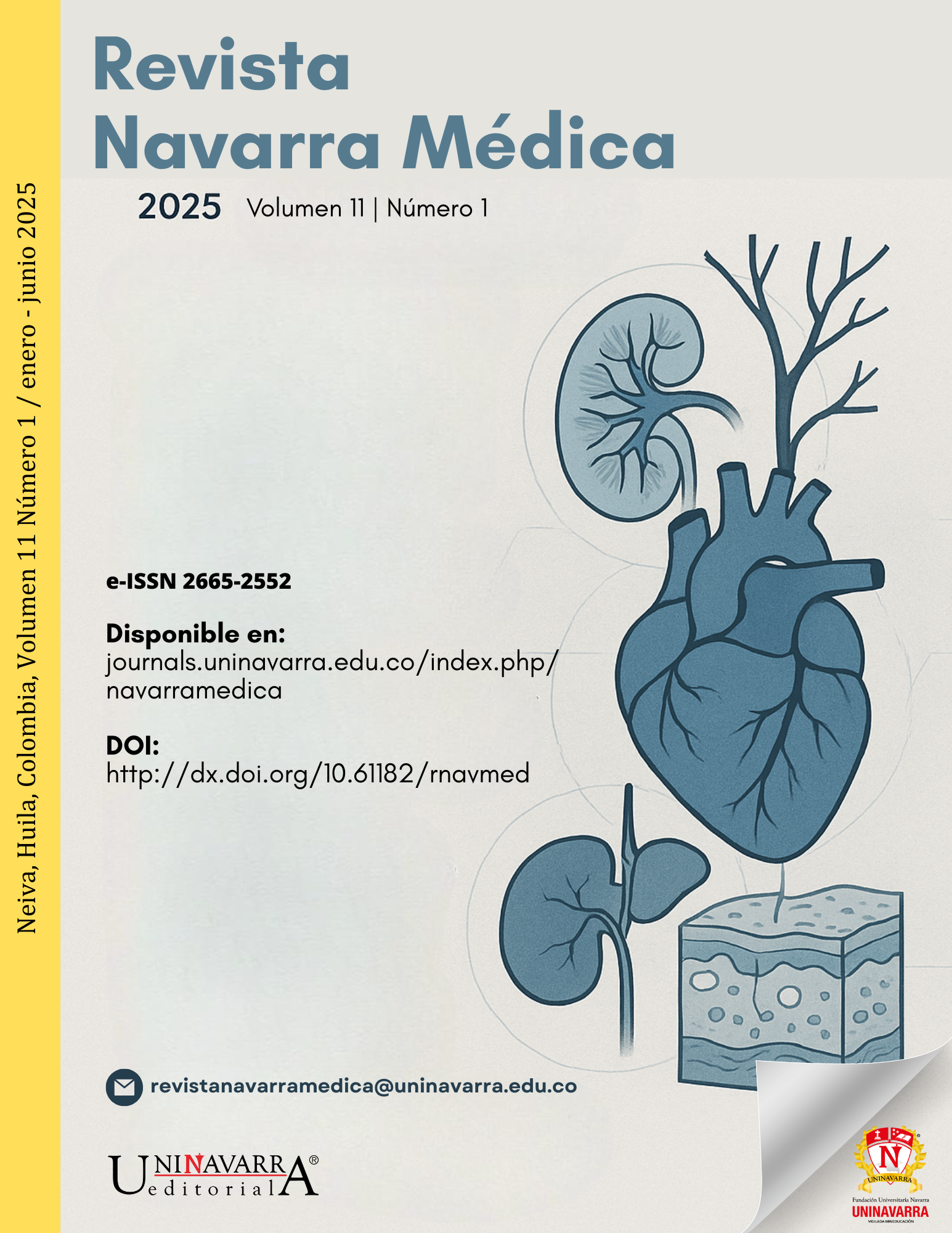Decoding the Vascular Code: Angiectasias and Lower Gastrointestinal Bleeding—A Case Report
DOI:
https://doi.org/10.61182/rnavmed.v11n1a3Keywords:
Anemia, Angiectasia, ColonoscopyAbstract
Introduction: Gastrointestinal angiectasias are vascular malformations that can cause recurrent bleeding, especially in older adults.
Objective: To describe the case of a patient with severe anemia secondary to colonic angiectasia and its successful treatment. Methods: A 78-year-old male patient, attended at a tertiary level hospital, presented severe anemia (hemoglobin: 7.1 g/dL). Endoscopic studies were performed: an esophagogastroduodenoscopy, which was normal except for a mild antral gastropathy, and a colonoscopy, in which an angiectasia of approximately 4 mm was detected. Results: The vascular lesion identified at colonoscopy was treated by endoscopic argon plasma ablation, achieving complete resolution of the gastrointestinal bleeding. Conclusion: Angiectasis should be considered in the diagnosis of gastrointestinal bleeding in older adults; therapeutic endoscopy is effective for its management.
References
1. Roa Ballestas PA, Molineros Baron C. Epidemiología, diagnóstico y tratamiento de las angiectasias gastrointestinales. Universitas Medica. 2023;64(1):1–13. https://doi.org/10.11144/Javeriana.umed64-1.edta
2. Sami SS, Al-Araji SA, Ragunath K. Review article: Gastrointestinal angiodysplasia-pathogenesis, diagnosis and management. Aliment Pharmacol Ther. 2014 Jan;39(1):15–34. https://doi.org/10.1111/apt.12527
3. Galiano MT, Cepeda R, Garcia F. Angiodisplasias de intestino delgado, presentación de dos casos. Rev Colomb Gastroenterol. 2004;19:269–276.
4. Athanasoulis CA, et al. Angiodysplasia of the colon: a cause of rectal bleeding. Cardiovasc Radiol. 1978;1(1):3-13. https://doi.org/10.1007/BF02551967
5. García-Compeán D, Del Cueto-Aguilera ÁN, Jiménez-Rodríguez AR, González-González JA, Maldonado-Garza HJ. Diagnostic and therapeutic challenges of gastrointestinal angiodysplasias: A critical review and view points. World Journal of Gastroenterology. Baishideng Publishing Group Co. 2019;(25): 2549–64.
6. Estigarribia Passaro J. El síndrome de Heyde. Revista Uruguaya de Cardiología. 2021;36(3):1–21. https://doi.org/10.29277/cardio.36.3.11
7. Heyde EC. Gastrointestinal bleeding in aortic stenosis. N Engl J Med. 1958;259(4):196. DOI: 10.1056/NEJM195807242590416
8. McDonald J, Bayrak-Toydemir P, Pyeritz RE. Hereditary hemorrhagic telangiectasia: An overview of diagnosis, management, and pathogenesis. Genetics in Medicine. 2011; 13, 607–16.
9. Micic D, Sengupta N. Risk Stratification of Angioectasia as a Cause of Gastrointestinal Bleeding: Untangling the Spider’s Web? Dig Dis Sci. 2019; 64(10): 2693–5. https://doi.org/10.1007/s10620-019-05750-z
10. Nasr S, Khsiba A, Hamzaoui L, Mahmoudi M, Ben-Mohamed A, Yaakoubi M, et al. Clinical features and bleeding risk factors of angiodysplasia lesions in a Tunisian population. Rev Gastroenterol Mex. 2024 Jan 1;89(1):31–41. https://doi.org/10.1016/j.rgmxen.2023.03.002
11. Sciberras N, Zammit SC, Ellul P. Management of small bowel angioectasias diagnosed during video capsule endoscopy. Annals of Gastroenterology. Hellenic Society of Gastroenterology; 2023; 36: 103–13. https://doi.org/10.20524/aog.2023.0780
12. Sriram N, Bar-Yishay I, Kumarasinghe P, Yusoff I, Segarajasingam D, Bourke MJ, et al. Definitive therapy of colonic angioectasia by submucosal coagulation. Endosc Int Open. 2019 Dec;07(12):E1773–7. https://doi.org/10.1055/a-0965-6688
Downloads
Published
Data Availability Statement
The authors have made the research data available to the public.
Issue
Section
License
Copyright (c) 2025 David Fernando Ortiz-Pérez, Guillermo Olaya-Villarreal , Jorge Armando Yepes-Caro , Jean Carlos Pinto-Angarita, Fernando Luis García-Del Risco

This work is licensed under a Creative Commons Attribution-NonCommercial 4.0 International License.








